"I
Quelli" went on in their session men activity until the beginning of the
70's. In 1970 Franz Di Cioccio was lent to "Equipe 84". This happened because
"Equipe 84" was being re-launched by the participation with L. Dalla to Sanremo
Festival. "Equipe 84" needed a drummer for eight months and "I Quelli" needed
to change their record company. Both bands were owned by Ricordi and that was
the good occasion to exchange courtesies. By lending Di Cioccio, "I Quelli"
got free from the old contract. Soon they left Ricordi to follow some dissidents
who were against the artistic line of the Milanese company. Three of them ,
L. Battisti, A. Colombini and Mogol founded a new record company called "Numero
Uno " (Number One). I "Quelli" where about to join Numero Uno.During
1970 Sanremo Festival "I Quelli" had the opportunity to debut in progressive
music. They were engaged by the "Whisky Club", (a club near Ariston Theatre,
where Sanremo Festival usually takes place) to perform some alternative music
in a town which was invaded by easy songs. "Please, no commercial music" was
the owner's wish, "Only progressive music breaking energy". During that transfer,
Di Cioccio's part as lent musician became very peculiar. From 8pm to 11pm he
performed well dressed up, live on TV from the Casino Dance Hall. Later, he
joined his friends at the club; he changed clothes and musical current, becoming
an instinctive, sweaty rhythm machine. The band's repertory was perfect, arranged
cunningly to catch the audience's attention, and consisted mainly in covers.
They chose particularly different songs of the most popular foreign bands in
the vanguard at that time. Every evening the club was invaded by people who
wanted to see the performance of the band which "used to do unbelievable things".
Thanks to this success "I Quelli" understood they were going to the right direction.
Immediately afterwards Sanremo experience "I Quelli" signed the new contract
with "Number One" . They also decided to change their name, because they wanted
to cut completely with the past, even if they would have lost all the engagements
as "I Quelli". The new name had to be different from everything already heard,
as, for example, the well known animal's name, which were very popular during
the sixties. The task was not easy. After many days spent imaging hypothesis,
the choice had to be done among Isotta Fraschini and
Forneria Marconi.
Finally they chose the second name, adding "Premiata", which means "Awarded".
At "Numero Uno" they were told their name was too long, but the band's philosophy
was clear: if the name was difficult to remember, it would also be difficult
to forget. Their philosophy won. This original choice was the right one, because
it gave birth to a new trend in Italian bands names. A new name, a strong wish
of success, some grit and an acrobatic repertory were the ingredients to made
up a new adventure. PFM needed only the good occasion to be discovered by the
audience. At that time Franco Mamone and Francesco Sanavio were the two most
important promoters in Italy and they were both aware that times were changing
because dance hall's era was going to its end. They started to promote the most
important foreign bands' concerts. Franco Mamone become PFM's manager and for
this reason PFM started to perform live show as special guests. They started
with Procol Harum, then with YES, but the good occasion came when they performed
as special guests before the concert
of the most important band of that time: Deep
Purple. The idea was a little bit daring, but courage have always supported
PFM's choices!
The echo of that beautiful
evening went far away. Times were really changing and live festivals were taking
place everywhere. Not long after, PFM had another good occasion to get known
and to grow up (from the artistic point of view). During summer 1971 in Viareggio
took place the first "Vanguard and New Trends Festival", the most important
Italian live festival of the year, where all the new Italian bands were invited
to perform. The Festival rules asked every participant to perform an unpublished
song. Franco Mussida, who was used to compose since the early beginning of his
musical adventure, composed "La Carrozza
di Hans" (Hans' coach). He composed it mentally while he was driving from
Turin to Milan. The song was arranged and prepared for the Festival. At Viareggio
Festival everybody were surprised by PFM's memorable performance which started
by an electrical and involving "overture", then Mussida took his classic guitar
and made people fly in Hans' story (Hans is a merchant who sells dreams) by
his sweet arpeggios…The audience was astonished. PFM achieved success and won
the Festival in equal worth with Mia Martini and Osanna.
After the first single (Impressioni
di Settembre and La Carrozza di Hans) PFM recorded its first LP "Storia
di un Minuto" (The story of one minute). They recorded live in studio, because
they wanted to transfer on their LP the peculiar energy and immediacy of their
music.
|
This LP had such a good success and PFM's
members decided to go back to the studios and record the second LP. They
were oriented towards Europe. The second LP "Per
un amico" (For a Friend) sounded differently, maybe more international
than the first one. What happened later confirmed that it was really "more
international". On December 20th 1972, Greg
Lake saw their showcase in Rome, at PalaEur. He invited them to visit
the Manticore (Emerson, Lake & Palmer Record Company) in London where
they also met Pete Sinfield, King Crimson's poet.
|
 |
 |
P. Sinfield, who was also Roxy Music
producer, went to their showcase in London and decided to produce them
and write the lyrics. He liked the warm, Mediterranean touch of PFM's
progressive music and for this reason he decided to continue with them
the same "research" he started with the first Crimson band. On January
1973 the band moved to London where they started to record their first
international LP at Command Studio. Irony of the fate, R. Fripp's King
Crimson were recording "Lark's Tongue in Aspic, while PFM was recording
"Photos
of Ghosts" - "Per
un Amico" English version -. During that period in London, PFM had
to modify slightly their name, because Englishmen could not pronounce
it properly.
|
 |
|

|
|
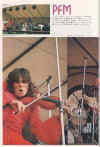 |
In fact, during the interviews they
remarked that everybody was mangling Premiata Forneria Marconi in the
most grotesques ways, that sounded like: Premiaticoni Fornaroncini Marconcinetti.
Pete Sinfield suggested to use simply PFM, which was an easier and more
international name. On March 24th 1973 PFM performed a showcase in London's
ABC Fhulan Theatre, but, unfortunately, the critics were not very warm.
They used to say: "these musicians are not too bad, but they are Italians!".
Anyway critics had to change their mind very soon. PFM's first English
single "Celebration" ("E' Festa" English version) was very successful
and PFM took part to Reading Festival. In that occasion, at the end of
their show there was a standing ovation and everybody asked for one more
song: Celebration.
|
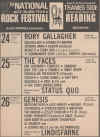 |
|
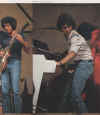
|
The most unexpected surprise came from USA,
because PFM's LP entered in BillBoard's hit parade. This event was really unbelievable,
because it was very difficult to be considered in that Hit parade, especially
for a non-english band. Things started to go on very well, because the band
received continuously new confirmations of their growing success. PFM reached
the second place in Melody Maker's Brightest Hopes hit parade and the third
place in New Musical Express's Brightest Hopes top ten.
 |
The band started touring all around Europe
with Pete Sinfield and M. Collins. PFM 's success grew everywhere and in
Italy everybody were astonished about this exceptional career. |
|
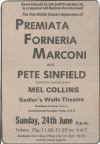
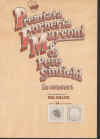
|
At that time PFM performed
many concerts, but the two most important shows were those at Zurich Jazz
Festival and at Montreux Festival. Both Festivals dedicated one day to
European progressive music and PFM's members were really honoured to perform
in those occasions. The first change in PFM's organisation happened before
the third LP's recording. They wanted to change their sound into something
more peculiar and efficacious, so they decided to look for a musician
who was able to sing too. They considered many applicants (Sinfield suggested
them to consider also the native speaker John Wetten, a good bass player
who could sing quite well). One evening Franz
and Mauro met Patrick Djivas in Rimini at "L'altro Mondo" club. At
that time Patrick was an "Area" member, a very expressive band whose sound
was a mix of jazz, ethnic music and experimentation. Few days later Patrick
joined PFM in London's Advinson Studios and took part to the recording
of the third LP "L'isola
di niente" ("The island of nothing", the Italian version of "The world
become the world"). Patrick decided to join the band because he was fascinated
by the opportunity to perform abroad.

|
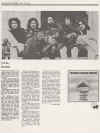 |
Patrick's musical versatile culture improved very much the band's composing
ability and introduced some ethnic sounds (for example in "La Luna Nuova"
- " The new moon" the Italian version of "Four holes in the ground").
He was also very fond of jazz and he shared with the band the same love
for R&B, rock and improvisation. "L'Isola di niente" (which was launched
in Europe with an English title: "The
world become the world") sounded different if compared with the previous
LP. In fact it sounded more complete and solid. By this new experience
PFM joined its artistic completion and become ready for the American turning
point. PFM could reach the top band's level because of its peculiarities
such as: original songs, rhythmic solidity and virtuosity.
|
 |
|
|
|

| From 1973 to the beginning of 1974 PFM
went on tour in Italy, Great Britain and Europe with Alvin Lee's Ten Years
After. "Photos of Ghosts"
entered in Billboard's American charts; PFM reached the second place in
Melody Maker's Pop Poll's Brightest Hopes chart (they were upper than important
bands such as: Eagles and Supertramp). The band also won the Japanese Critic's
prize as the best band of the year. After these exceptional results, their
record company Manticore decided to organise there first show
case tour in the USA in order to launch "The world become the world".
During that tour, Mr. Mario Medius, Manticore's artistic director in NY
suggest PFM to record some live concerts and few time later Manticore launched
"Cook", their first official Live LP which was also launched in Italy entitled
"Live in USA". |
 |
| |
|
AROUND
THE WORLD
"Cook
" reached the 150th place in Billboard's hit parade. That was really
a great target for an Italian band.
|
 |
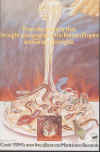
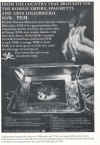 |
PFM's first performance in the USA was
in LA, at the Whisky Club. Their concerts were sold out for 4 days. They
also performed some days at the Rainbow and at the Golden Bear where it
happened the same. Soon afterwards they started to perform with many important
stars, such as Santana, ZZ Top, Allman Bros, Poco, Beach Boys, Dave Mason.
PFM's success was growing and they entered in the small group of those bands
which were famous for their live performances. |
| In the first two months they performed
50 concerts from coast to coast and they took part to several open-air festivals.
They took part to "Charlotte Speedway"
were 280.000 people attended. They also performed some live concerts in
TV taking part to several shows such as "The Midnight Special" and "In Concert"
together with Stephen Wolf and Harbie Hancock. |
|
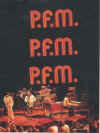 |
Anyway they started to get tired of being
sacrificed, especially from the financial and affective point of view. If
they wanted to have success in the USA they should have stayed on tour for
at least one year. That was what happened to Peter Frampton (who was on
tour in the same period) : he went on touring for one year and then he recorded
"Frampton comes alive". They had to strike while the iron was hot, that
was true, but they started to miss Italy
very much. They decided to go back to Italy, stopping for a little while
the American project. Once back to Italy, they decided to rest a bit and,
above all, to make some changes. They decided to add another member, a vocalist,
who would have sung all the songs in order to let them concentrate on the
musical performance. They chose Bernardo Lanzetti,
who was "Acqua
Fragile" leading singer, a band produced by PFM. Bernardo Lanzetti had
a strong vocality, which could bear PFM's sound impact; he also spoke American
English quite well, because he attended a Texan college. |
| The "new" band started recording a new
LP "Chocolate King".
Lanzetti got into the group very well, participating actively, writing lyrics
in co-operation with Mauro Pagani and Marva Jean Marrow and singing really
in a remarkable way. |
 |
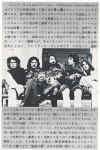 |
Musical parts were composed by Premoli
and Mussida . The LP had a quite good success in Italy, even if some critics
did not agree with PFM's decision to stop recording a double version of
each LP (one in Italian and one in English) to sing only in English. As
usual the LP was a live-performance recording in studio, because PFM's
fans seemed to like the energy given off through live performances. "Chocolate
Kings" was also launched in Great Britain where it was really successful,
even from the critics point of view. This new success convinced PFM's
members about their international fame and for this reason they decided
to start touring in Japan.
|
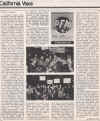 |
|

|
|
In Japan PFM's members had really many fans who were looking
forward to see them performing live. Tokyo,
Osaka and Nagoya concerts had an enormous success and PFM received the gold
LP record. Thanks to Japanese audience's participation and fervour the Japanese
tour is still considered by PFM one of the most significant experience in their
whole career. Soon after the Japanese tour, PFM started a new tour in USA. PFM
with its leading singer was well accepted in the USA too, even if the LP was
criticised because of its lyrics which were not very close to the American way
of thinking. By the time "Chocolate Kings" entered in the English Top twenty
(maybe that was the compensation for the tepid American welcome), consequently
PFM came back to Europe and started its fourth English tour.
| During one of the last shows it happened
something that the band would have remembered forever. One day, while the
band's members were rehearsing for the last concert which had to take place
at the Royal Albert Hall, they received
the Queen Mother unexpected visit. As Her Highness liked Italian music,
in Her honour Premoli played Albinoni's adagio on his Moog.
That night "L'Altra Domenica" troupe (a very popular Italian TV Sunday show)
televised the concert live in Italy to show PFM's international success.
PFM's success abroad was still unbelievable. Once back to Italy Mauro Pagani
decided to leave the band, because he was tired of touring around the world
and, above all, because he was so busy that he could not go on with his
personal artistic research. He left supported by the band's members who
understood his need to go on in his personal way. PFM also decided to stop
and rest for a while. |

|
CONTAMINATIONS
- NEW WAYS TOWARDS ROCK
Mauro's giving up coincided with the end of an
important and eventful period which took PFM towards unexpected results. The
international success (from the tours and hit parades point of view) was a very
good result and the band had to look for new creative ideas. All the members
agreed with the need to make some changes. At the beginning they thought about
introducing a second guitar player to support Mussida and create a completely
different sound. Afterwards they thought about introducing a saxophone player,
because they remembered about the important experience they had with Mel Collins
during Sinfield's European Tour. Anyway at the end they decided to remain five.
They rehearsed a lot because they did not want to loose the peculiar artistic
form they had at that time. They wanted to repeat the success they had in USA
before "Chocolate Kings", an LP with unexpected outcomes. The LP was very successful
in Europe - especially in UK - in Japan and in Italy, but less in the USA, particularly
from the critics point of view. Maybe people did not like the cover with the
curled American flag. For sure the Italian cover was more suitable and ironic
with the image of a fat and decadent Marilyn Monroe. Fortunately, not everybody
in the American Music Business agreed with the critics, in fact "Electra Asylum"
director proposed PFM to join the company's team. This happened, of course,
in England, during Chocolate Kings promotional tour, at the end of PFM's show
at the Royal Albert Hall. PFM made also a brilliant performance in "Old Gray
Wiste Taste", the most important English live TV show .
They went to LA and signed the new contract. They were really enthusiastic,
thinking about a new American adventure. During their long stay in California
they could learn a lot about the new musical trends of that area, especially
about Jazz Rock, the new current characterised by sophisticate arrangements
which was getting more and more appreciated by estimators. PFM's members got
involved almost unconsciously, especially because they were influenced by their
friends of that time, such as: Frank Zappa,
Jaco Pastorius, Billy Choban, Lenny
White and many other musicians who belonged to West Coast rock jazz set. Anyway,
PFM's members got also involved because it was impossible to stay apart end
avoid any cultural exchange with that kind of friends.
At that time, while PFM was creating/composing for the new LP, they met Greg
Bloch. One day Greg came to see them while they were rehearsing at home (they
were staying in a villa which was half home and half recording studio). Greg
was an excellent violin player. In the past he joined the band "It's a beautiful
day". When he met PFM he was one of Mark Almond Band's members. Everything happened
very quickly. PFM did not want to add a new violin player, but Greg was so talented
and his musicality was so rich that they could not help inviting him to join
"Jet Lag" project. "Jet Lag" (an emblematic title about the rapid time zone
change which happens when someone is flying for a long journey) meant something
different for PFM: it was an imaginary musical journey, a comparison among different
cultures. The Band's members wanted to express how things were changing their
identity whenever it happened them to leave their country to reach the USA.
The LP got ready in January 1977. The project itself was very interesting, but
it was conceived in a moment of trend change: punk wave was born and the market
seemed to become very interested in dance music. Anyway, Jet Lag was built up
on a very interesting project, so the criticism and the most intellectual California
public appreciated it very much. In fact, American Press considered "Jet Lag"
as one of the best example of cultural "contamination" among different musical
words. Two different cultures (Mediterranean culture and West Coast rock jazz
culture) could meet through PFM's members' experience, as they were living two
realities at the same time.
Jet lag cover
was included in "The Illustrate History of Rock Album Cover" a book which contained
the most beautiful covers in the world. PFM had its official place in the "New
Musical Express Encyclopaedia of Rock". Starting Jet Lag launch PFM decided
to found its first recording company, the Zoo records. This new company was
founded to be the intersection point for the new Italian musical trends.
 |
Jet Lag project coincided also with the
end of the American experience, because PFM decided to stay in Italy, rediscover
Italian culture and find some new ideas. The following LP, entitled "Passpartù"
(that is to say the Italian phonetic transposition of the French word "Passe-partout",
which means master key) was characterised by the acoustic dimension and
by the return to Italian language. "Passpartù" was for PFM a new key to
enter in a different musical adventure. |

 |
Live performances changed too, because
PFM started to invite some guests, such as: Roberto Colombo (keyboards),
Roberto Haliffi (percussons). Gianfranco Manfredi co-operated with PFM for
lyrics and Andrea Pazienza, the comic strip illustrator drew the LP cover. |
\
| PFM went on tour to promote the new LP,
but unfortunately "Passpartù" did not succeeded as the band hoped. Anyway
critics and audience appreciated live performances very much. Soon after
"Passpartù" experience, Bernardo Lanzetti decided to quit the band, because
he could not fix his role within PFM and also because he was oriented towards
American rock music. He went on singing alone. PFM had to find a new balance.
All the members had to start over again and, above all, they had to find
new creative ideas. The band had to face its first artistic
dilemma. |
 |
PFM's members decided to drive out their doubts by touring
again, because they wanted to receive the right energy from the audience
support. One evening, while they were performing in Sardinia, they met an old
friend, Fabrizio De André. In the past PFM
had already worked with Fabrizio for "La Buona Novella" project (The Gospel).
That evening Fabrizio De Andrè was really impressed by PFM live performance,
that is why Franz Di Cioccio proposed him an artistic co-operation. Fabrizio
De Andrè listened to some new arrangements of his songs performed by PFM and
he liked them. PFM and Fabrizio De Andrè gave life to a wonderful live project;
the tour which was very successful.
 |
Fabrizio's original music was re-arranged
and transformed by PFM's new ideas. Our friends were able to create new
sensations around lyrics. The audience could fly on fantasy's wings and
discover new feelings and emotions coming from the songs that everybody
already knew and loved. The co-operation among Fabrizio De Andrè and PFM
was an artistic choice which gave birth to several other experiences of
the same kind in Italian music outline. The experience with Fabrizio De
Andrè was really important for PFM because the band received new energy.
Fabrizio taught everybody something very
important: lyrics were a song's lasting part in people's memory. The
audience liked virtuosity, but everybody remembered words more than music,
that is why every time Fabrizio started to sing a song the audience used
to welcome his voice with ovations. PFM understood word's importance in
Italian market and realised their biggest mistake: they had always given
too much space to music, forgetting lyrics's great communication power.
They also understood that they needed a front man, a trait d'union among
the audience and them. Franz Di
Cioccio, who was very exuberant, seemed to be the right applicant
for that role. Franz was really happy about that opportunity, because
he knew about other drummers' experiences of that kind (for example Phil
Collins) which were very positive. So he became PFM's front man. The new
project coincided with ZOO Records closing and with the signature of new
contract with RCA. PFM's members were going to face a new project and
the beginning of the 80's era. They felt they were supported by a growing
enthusiasm.
|
TOP


















